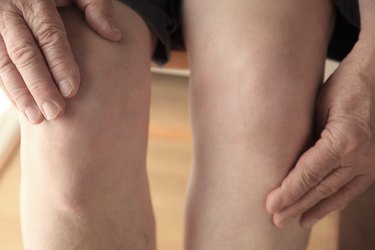
Weight loss, according to the American Council on Exercise, can significantly improve your health by lowering your risk of heart disease, diabetes and stroke. Additionally, the loss of a few pounds can improve your appearance, boosting your self esteem. While weight loss is generally positive, there can be unexpected consequences including joint or knee pain. If your knees hurt when you lose weight, there can be a number of causes.
High Impact Exercise
Video of the Day
When many people attempt to lose weight, the first thing they do is take to the running track or the treadmill in order to burn extra calories. The National Strength and Conditioning Association warns however, that high impact exercises like running and jumping rope can take a toll on your joints. If you are experiencing knee pain surrounding exercise, try switching to lower impact exercises, such as cycling or incline walking.
Video of the Day
Extreme Fat Loss
While body fat is often viewed as unhealthy or unnecessary, fat does play several important roles in the body. At normal body fat levels, fat acts as a pad and natural shock absorber for joints like the knee. Extreme fat loss, often seen in competitive bodybuilders and endurance athletes, can reduce the fat pads in the joints, placing more stress on the knees. If you are already lean and begin to lose more fat, you might notice your knees taking more abuse, especially during exercise.
Poor Diet
Most people know that a successful weight loss program involves ingesting fewer calories than you burn. It's still important, however, to make sure you're getting all the nutrients you need. Extreme dieting can leave you deficient in essential fatty acids and antioxidants that contribute to joint health. Consult an online caloric needs calculator, like the one provided by the American Council on Exercise, to make sure you're eating enough calories for your age, weight, height, gender and activity level. Eat a balanced, nutrient-dense, fiber-rich diet that contains the healthy fats you need for strong joints.
Muscular Imbalance.
Exercise, especially if you've previously been sedentary, can cause or exacerbate muscular imbalances around the knee. An imbalance between your quadriceps and hamstrings can put stress on the knee joint. By stretching your quads and hamstrings both before and after exercise, you can keep your knees healthy and pain free.
Is this an emergency? If you are experiencing serious medical symptoms, please see the National Library of Medicine’s list of signs you need emergency medical attention or call 911.